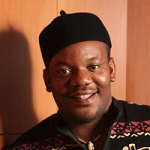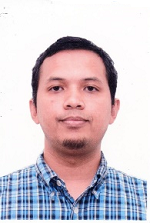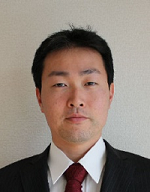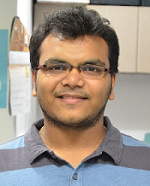
YOUNG ENTREPRENEURSHIP AWARD 2016

YOUNG ENTREPRENEURSHIP AWARD 2016
 Sana Talmoudi (Graduate Student, Tohoku University, Tunisia)
Sana Talmoudi (Graduate Student, Tohoku University, Tunisia)
Eyes on Sign Project, Transportation Infrastructure Evaluation System
Currently it requires several hundred million yen (several million US dollars) to inspect road damage using an expensive road surface inspection vehicle and analyzing vast amounts of data. Ms. Talmoudi has analyzed changes in vertical acceleration due to road conditions based on data obtained from a commercially available drive recorder on board a usual car, and succeeded in visualizing the extent of road damage using a toorPIA data analysis system, thus enabling an inexpensive evalutation of road infrastructure based on drive recorder data. Following her finding, the Fukushima Prefecture road service authority has conducted a feasibility study of a new road infrastructure evaluation system using a drive recorder, and obtained data comparable to those obtained using an expensive road surface inspection vehicle. The new road evaluation system enables every day road inspection whereas the special road inspection vehicle can be used only once every 5 years because of the availability of the special vehicle. The new system will reduce the current road inspection cost to one fourth.
The development of the new road infrastructure evaluation system is a collaboration project among the Fukushima Prefectural Government, Tohoku University, and a private company, toor Inc., Ms. Talmoudi has been actively involved in the project by collecting and analyzing data, and has made a significant contribution to the realization of the new road infrastructure evaluation system. She has not only contributed to the development of the new road infrastructure evaluation system, but also plans to apply the data analysis system to the diagnosis of Sleep Apnea Syndrome and to information security. Her efforts deserve the Best Entrepreneur Award.
 Nnaemeka Ikegwuonu (CEO, ColdHubs Limited, Nigeria)
Nnaemeka Ikegwuonu (CEO, ColdHubs Limited, Nigeria)
ColdHubs – solar powered cold rooms to extend the shelf life of fruits and vegetables for African farmers
Smallholder farmers lose major harvested vegetables and fruits as a result of food spoilage in Nigeria because they lack a sufficient electrical supply, and do not have access to reliable cold storage. Mr. Ikegwuonu felt the necessity of providing cold storage space to smallholder farmers, and developed solar powered walk-in cold rooms in 2014, using his private fund of 7,800 US dollars. With a grant from the Nigerian government, he conducted a feasibility study of solar powered cold rooms, and proved that the shelf life of vegetables was extended from two days to 21 days by maintaining cold room temperatures between 5 and 15 degrees. Based on the success of the feasibility study, he established ColdHubs, Limited in 2015. Currently three cold rooms are running that provide 450 rental cold boxes, each of which stores 30 kg of fresh vegetables and fruits. The rental fee for one box is 50 US cents a day. With this service, farmers can reduce crop loss by 80%, and increase their income by 25%. The Takeda Foundation highly evaluates his commitment to a specific local challenge by establishing his own company, ColdHubs, Limited, and providing a practical solution to smallholder farmers in Nigeria. He deserves the Selection Committee Special Award.
 Angeline Makore (Founder, Mwedzi Social Enterprise, Zimbabwe)
Angeline Makore (Founder, Mwedzi Social Enterprise, Zimbabwe)
Social Enterprise – Reusable Sanitary Pads
In Zimbabwe, a packet of non-reusable sanitary pads for women costs more than one US dollar, while poor families survive on less than one US dollar per day. Adolescent girls are known to engage in inter-generational sexual relationships to earn a bit of money to purchase pads. This leads to enormous problems such as unwanted pregnancies, sexually transmitted infections, HIV infection and a high teenage mortality rate due to unsafe abortions. Lack of access to sanitary wear has a considerable negative impact on the economy.
In-order to mitigate these problems, Ms. Makore has incorporated “Mwedzi (Moon) Social Enterprise” to produce reusable sanitary pads made from locally available materials. The unique points of this enterprise include not only selling the products, but also on providing girls from impoverished backgrounds with free sanitary pads that can be used for more than one year, as well as providing jobs for women. The pads will be on sale from January 2017, at a price of six US dollars for 5 pads. Ms. Makore’s plans include not only selling the products, but also providing hygiene management education to girls in order to have a positive influence on the economy in a broad sense.
The Foundation evaluates her efforts and contributions toward developing a bright future for women in Zimbabwe.
 Anuar bin Mohamed Kassim (Senior Lecturer, Technical University of Malaysia, Malacca, Malaysia)
Anuar bin Mohamed Kassim (Senior Lecturer, Technical University of Malaysia, Malacca, Malaysia)
My 2nd Eye
Visually impaired persons use canes to detect dangerous obstacles when they go out, but they cannot detect obstacles located above breast height with canes, and tend to get injured by hitting their heads on obstacles. Mr. Kassim felt a need to provide visually impaired persons with something to detect higher obstacles, and developed a goggle type obstacle detector. The goggles contain an ultrasonic detector that can detect obstacles located within 1.5 meter of the goggles. The goggles inform the distance of an obstacle from the goggle carrier by the volume of its warning sound, and the direction of the obstacle (ahead, right, or left) by the pitch of the sound. The goggles inform the extent of battery charge by the number of sound pulses. The goggles weigh only 50 grams, and can be carried without discomfort. Mr. Kassim conducted a feasibility test and proved that the goggles can detect higher obstacles. The goggles are the first detector for higher obstacles for visually impaired persons. He has been improving the quality of the goggles, and has provided 30 goggles to visually impaired persons through NGO and company CSR activities. The Technical University of Malaysia, Malacca, holds the IPR, and Mr. Kassim is preparing to establish his own company to manufacture and sell the goggles. The Takeda Foundation evaluates his efforts highly, and gives the Entrepreneur Award.
 Kazuyoshi Kanamori (Assistant Professor, Kyoto University, Japan)
Kazuyoshi Kanamori (Assistant Professor, Kyoto University, Japan)
Development of Organic-inorganic Hybrid Aerogels for thermal
Superinsulators
Silica aerogels have a very low thermal conductivity and can be a good material for use as a thermal insulator. However, they have an extremely low mechanical strength, and their production process requires a stage of supercritical drying to avoid irreversible shrinkage. This raises the total manufacturing cost and has been a major barrier to the mass production of silica aerogels. After serial experiments, Mr. Kanamori has succeeded in developing a new production pathway without the supercritical drying step to produce new organic-inorganic silica aerogels with very low thermal conductivities (15 W/m・K) and sufficient mechanical strength. The new aerogels also have new properties such as transparency and flexibility. The new production pathway uses a new starting compound that replaces one of the methoxy groups of the current starting compound with a methyl group, and involves a hydrolysis reaction under acidic conditions followed by alkaline polycondensation to produce solid gel skeletons. The new aerogels can be mass-produced at one-tenth the cost of usual silica aerogels, and can be used as transparent thermal insulator for building windows. The new organic-inorganic silica aerogels are regarded as the next generation of low cost super thermal insulators by industry. Mr. Kanamori has been collaborating with private companies to market the new aerogels in 2020, and his efforts deserve the Entrepreneur Award.
 Tanuj Jhunjhunwala (CEO, Planys Technologies Pvt. Ltd., India)
Tanuj Jhunjhunwala (CEO, Planys Technologies Pvt. Ltd., India)
Underwater Robotic Inspection and Survey Solutions
Recently, measures to address the aging of old infrastructure are becoming more and more important. Especially, alternative ways to safely inspect offshore structural assets are necessary to replace dangerous and costly underwater inspection by human divers. Mr. Jhunjhunwala started the development of a small underwater inspection robot in 2013, and succeeded in producing a compact, portable, and maneuverable underwater inspection robot with the features of modularity. He established Planys Technologies as CEO with graduate students and faculty members from IIT Madras, and started the manufacture and sales of underwater robots, and an inspection service using underwater robots in February, 2015. Their underwater robots have been used successfully to inspect of offshore tanker terminals damaged by the cyclone in 2014, and for the inspection of underwater gates located at the bottom of a dam where crocodiles live. Planys Technologies has obtained more than 20 customers in India, and the company plans to expand their underwater inspection business to emerging countries including those in Southeast Asia and the Middle East where there is an increasing demand for the inspection of underwater infrastructure.
The Takeda Foundation highly evaluates the fact that Mr. Jhunjhunwala has addressed an increasing demand for underwater inspection by developing and providing small size underwater robots, and by offering low cost underwater inspection. His challenge deserves the Entrepreneur Award.